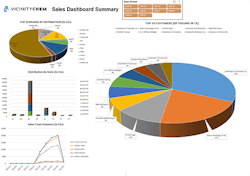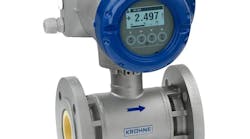Supply-chain issues, global competition and the need to deliver high-quality products are challenges facing many chemicals manufacturers today. To meet these challenges, you must keep track of inventory, improve operations, make better products and drive smart, sustainable growth. It’s a tall order but the right tools will help. To learn about industry-specific solutions, Chemical Processing sat down with Randy Smith, co-founder and CEO of Vicinity Software. The Marietta, Georgia-based company’s VicinityChem is a comprehensive process-manufacturing ERP software system designed for chemical manufacturers.
Co-founder and CEO, Vicinity Software
Q: In today's climate, what do chemical processing facilities need to do to keep up with inventory changes?A: In terms of supply-chain issues, we're really having all kinds of new challenges and struggles. It is becoming more important to know what you've actually got on hand, what you've already ordered from various suppliers and what their timelines are of delivering that product to the facility in a timely basis.
Knowing what you've got available and then predicting into the future what your usage is going to be so that you can communicate that with your suppliers is key. You need to be able to reveal real-time inventory quantity on hand. When you record a transaction, you are updating the system in real-time. You are able to use calculations in the system, material-requirements planning to help you identify what you're going to need and when you're going to need it, and also when you're going to see shortages in the future.
There are so many unknowns; if you can control the things you can control and do that without spending a lot of time and effort to do so, that will put you ahead of those in line for the same chemicals, the same ingredients you're needing. I think that's an important key to making it through the next few years as the supply chain starts to settle back in.
Q: How important is it for facilities to know how changes in inventory costs will affect production?
A: Not only are we having supply-chain issues, price changes are very volatile right now, too. We're seeing it at gas pumps, grocery stores, in supply chains for chemicals. Manufacturers really have three ways to address this. One is to increase their prices to the customers. Two, they can absorb the price increase; or three, they can find substitutes for those ingredients, if that's even possible. Factor in transportation costs that are increasing as well — just getting the product from point A to point B is becoming more important. So, basically, with this increased volatility of price, we need to be able to calculate the costs of production more accurately and out into the future. In other words, knowing if my cost is a dollar today, it's probably going be $1.10 in the future pretty quickly. And being able to get ahead of that cost change is a real challenge for many chemical manufacturers. What they need is a system that allows them to look at what the current inventory price is without having to do any work and be able to deal with price volatility.
Q: What are the benefits of an accurate chemical usage forecast?
A: Who is your ideal customer? They are typically people who are predictable. They are easy to work with even if you have slippages in your production schedule, they're able to adjust with that. So, being able to predict what your raw-material usage is going to be and communicate that to your supplier makes you a better customer for your supplier. And when you're a better customer for your supplier, you're going to start getting breaks. Whether that be price breaks or availability of inventory, or when you do need something expedited, they'll go out of their way to solve that problem for you, because you've already paid that forward by making your supplier's life a lot easier. You're stabilizing their production schedule. You become a more predictive type character. You become a good customer.
And to be able to do that, you need a system that can look at those quantities on hand, look at the material requirements planning, to identify where your shortages are going to be so that you can communicate that with your supplier on a timely basis.
Q: Why is it important to review vendor performance on a regular basis?
A: Everything changes over time. The same company that you bought from five years ago may not be the same today or into the future. They've got their own supply issues, they may have management issues, changes in management. They may have gone through an acquisition where they're now part of a larger group or a conglomerate. So, over time companies can change. Those changes can have an impact on things like quality, price, delivery times, and even customer service. The challenge associated with that change is you need to have some type of systematic strategy to look at vendor performance, something objective. Whether that be meeting lead times, or price increases, or potentially adjusting to a change in the production schedule for you, coming up with some type of reasonable method to identify how they're performing against what you need.
And remember that not all suppliers are the same and they supply different products and those products may have more effect on your ability to produce than other products. Looking at the suppliers related to each other—putting them in categories of how critical to your business success is really important. And when you do start seeing changes in real-time and communicate with that supplier, "Hey, we're seeing X, Y, and Z, is there a reason here for this? Is there something we can do to help with that? Is that something you're going to be able to address?"
With VicinityChem, matched with Microsoft Dynamics, you're able to monitor those vendor relationships and how they're supplying to you. This information becomes really helpful for the procurement folks to have that conversation. It can be a difficult conversation, but if you come with actual metrics, you come with things that you are tracking and say, "This is what we're seeing, how can we work together to make this change?" It will go so much better with your supplier.
Q: What about the importance of data analytics?
A: VicinityChem has been around for about 20 years and I've been in formula and batch manufacturing for probably closer to 30. And it's really been interesting that previously, we were really struggling to get data. It was very dependent upon somebody in an IT environment or somebody keeping big stacks of papers or keying that into Excel, etc. I think the opposite is true now. We have way more data than we ever knew what to do with. And it's readily available. The key question is what are you going to do with that and how are you going to make sense of it?
Standard dashboards are available as a starting point for sales, operations, quality and scheduling.
We can get data out of a control system, a piece of equipment or the web. But what do we do to be able to make that meaningful? You need to keep that data in its original source. There's no reason to push that out to Excel and create a whole other stockpile of data, but rather leave it in the system. Or, maybe there's analytical data out in the web that you can just extract over time and you can see that data in real-time.For example, housing starts, if that's relevant to your industry, you’ll be able to see that and over time, those numbers are going to change. Don't bring it into your system, but rather leave it out there and analyze it, extract that data if you will, use it with various tools. And when you do that, you start decoupling yourself from IT departments that have to import or export data, or get it from one source to the next source. With today's technology, you're able to actually reach in and see that data and use it and correlate it with your existing data. You can take this information and put it up on a webpage so that your salesperson is able to see that data. That data now becomes meaningful to the company and to the individual. And I'm not having to wait for an IT department to go and put it in a dashboard or in a graph that is helpful to me. I am able to do that.
Q: Do you have anything to add?
A: I think it's important for people to realize that the tools are out there and they're not as scary as people might think. You don't have to invest a huge amount of time or effort to be able to look at data. We've got some real challenges ahead of us, but they're very manageable, especially with a system where you can get to your data—whether that be pricing data, inventory or compliance data. You're able to get to that data to be able to make decisions that are even more important than they were last year. As we come out of the pandemic, as the supply chain starts to hopefully clean itself up in the months and years to come, things will get a bit easier for us. And once on the other side of it, we will be stronger and more versatile and more agile as we move forward.
For more information, visit: vicinitychem.com/supply-chain-software





